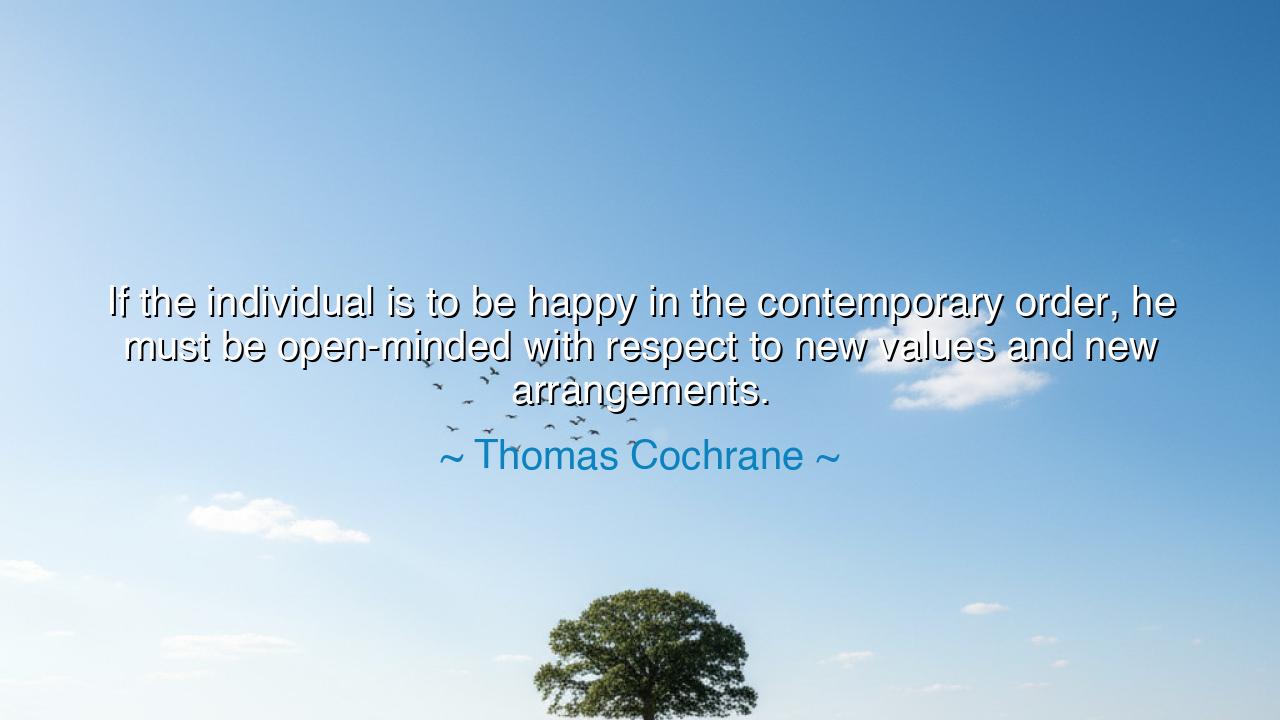
If the individual is to be happy in the contemporary order, he
If the individual is to be happy in the contemporary order, he must be open-minded with respect to new values and new arrangements.






Hear the words of Thomas Cochrane, who declared with clarity and foresight: “If the individual is to be happy in the contemporary order, he must be open-minded with respect to new values and new arrangements.” In this statement lies both a challenge and a promise. It is the challenge to abandon rigidity, to let go of the chains of stubbornness that bind the human heart, and it is the promise that those who open themselves to new values and new arrangements shall find a path to harmony in an age of change. For the world does not stand still, and happiness belongs not to those who resist the tide, but to those who learn to sail upon it.
The meaning of his words is this: that each age brings forth transformations—technological, cultural, and moral—that demand flexibility of spirit. In the contemporary order, the world spins faster, ideas clash more fiercely, and traditions are tested by the weight of innovation. To be happy, one cannot cling only to the old, as though it were unchangeable stone, but must cultivate an open mind, a heart capable of discerning which new values bring truth and which new arrangements bring justice. Without such openness, the soul grows bitter, lamenting change instead of shaping it.
The origin of Cochrane’s reflection lies in the storms of the modern era, when societies were confronted with the upheavals of industry, science, and new philosophies. In earlier times, order rested upon inherited traditions, but the contemporary world demanded adaptation. Cochrane saw that those who refused to adapt were crushed beneath the weight of change, while those who embraced openness found freedom and peace. His words are not a call to abandon wisdom of the past, but to blend it with the wisdom of the present, forging a path where the individual may thrive.
History reveals many who lived by this truth. Consider Emperor Meiji of Japan, who in the 19th century faced the crumbling of old feudal ways under the pressure of foreign powers. Rather than resist the age, he embraced new values and new arrangements, leading his people into modern industry, education, and governance, while still honoring their ancient spirit. In this openness lay the secret of Japan’s rise, and the happiness of its people who, instead of being broken by change, were strengthened through it. His story embodies Cochrane’s teaching: openness brings life, while rigidity breeds ruin.
The emotional strength of this teaching lies in its call to courage. To accept new values is no easy task, for it often means questioning the familiar, surrendering the comfort of what has always been. Yet, as Cochrane reminds us, it is only through such openness that true happiness can be found in the contemporary age. For to resist change is to live in perpetual struggle against the flow of time; but to embrace it wisely is to walk in step with life’s unfolding rhythm, transforming fear into opportunity.
The lesson for us is clear: we must train ourselves to listen without fear, to examine ideas without prejudice, to adapt without losing our integrity. The world will continue to bring forth new technologies, new beliefs, new ways of living. To reject them all is folly, yet to accept them blindly is also dangerous. Instead, cultivate discernment with an open mind, weighing carefully, embracing what leads to justice, peace, and joy. In this way, we may not only survive change, but find happiness within it.
Therefore, let your actions reflect this wisdom. When new ideas cross your path, do not turn away in scorn, but listen. When new ways of living challenge the old, do not cling in fear, but discern their worth. Teach your children to be flexible without losing their roots, to be courageous without being arrogant, and to be open-minded without being reckless. In this balance lies the strength to flourish in the contemporary order.
And so, remember the words of Thomas Cochrane: “He must be open-minded with respect to new values and new arrangements.” For the river of time flows ever onward, and only those who bend with its currents without breaking will find happiness upon its banks. To embrace openness with wisdom is not weakness, but the highest form of strength.






AAdministratorAdministrator
Welcome, honored guests. Please leave a comment, we will respond soon